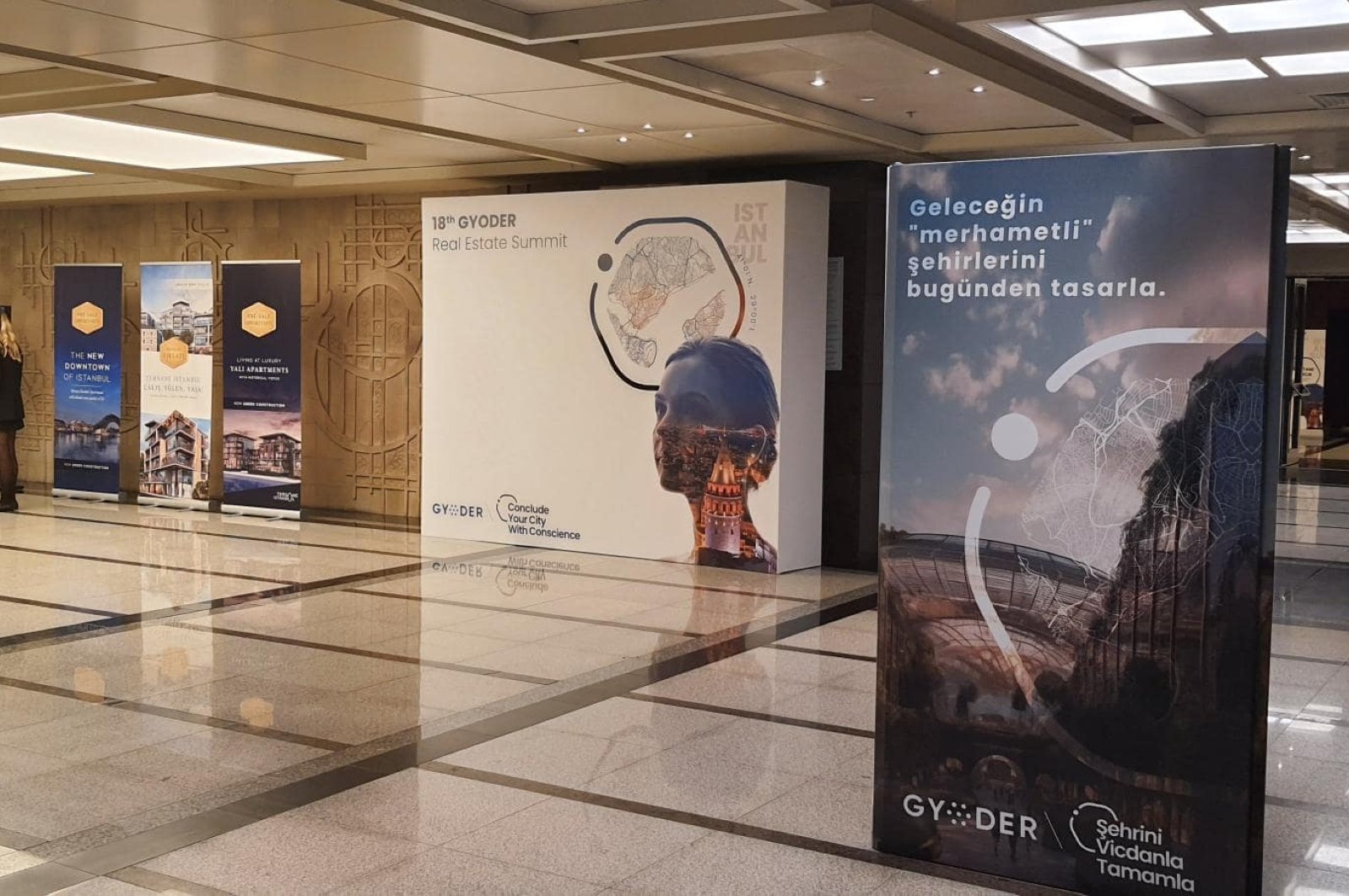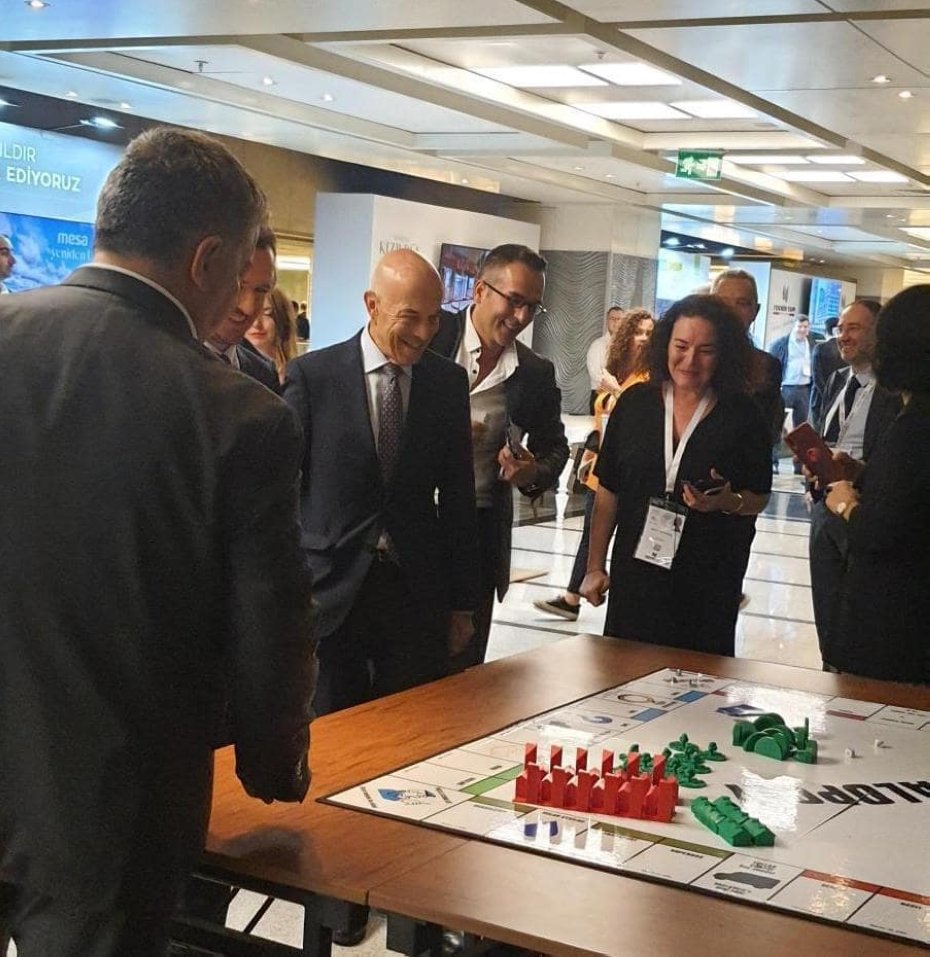
The two-day 18th GYODER Summit, carrying the theme "Conclude Your City With Conscience,” kicked off Wednesday in Istanbul Congress Center, seeing the participation of real estate sector stakeholders, business world representatives, and national and international speakers.
The summit covers a wide range of panels and themes ranging from housing to migration, from disasters to sustainable cities, from the financing dilemma in real estate to new approach models in accessibility in Türkiye.
The first day of the summit saw the panels "Learning from Disasters” and "The New Dynamic of Urban Transformation: Joining Forces,” where solution proposals for the problems cities are facing were discussed by reflecting on the disasters and climate crises that threaten all the world’s cities.
It also presented the documentary "Hope Line,” which depicts efforts on reconstruction conducted by GYODER in the region impacted by the early February earthquakes.
Keynote speaker at the event, Ian Goldin, professor of globalization and development at the University of Oxford and the director of the Oxford Martin Programmes, delivered a speech focusing on the age and dynamics of the cities and the challenges cities are facing nowadays.
Speaking to Daily Sabah, Goldin said he believed that the future would be shaped in the cities, which he touched upon in his latest book while highlighting the importance of a common approach to shaping the cities in the future.
"I wrote this my latest book, 'The Age of the City,' because I believe that our future will be shaped in the cities, for good or for bad, and that we need to make cities that will create a better life for people in the future,” he said.
"I think what we have learned from crises. We learned it from COVID-19. I think Turkey has learned it from the earthquake is that we are not individuals, we are part of society, we care about people, we care about community, even people we don’t know we care about and that sense of solidarity, being able to help other people is central to the future of cities,” he explained.

However, Goldin emphasized that we witness many good or bad examples of cities that work or are the real problem for the people.
"New challenges, for one remote work, which is leading to a lot of empty offices, a lot of wealthy people leaving cities, that’s a challenge,” the professor highlighted, adding to the challenge of climate crisis, that he said was "traumatic” for the cities.
Furthermore, he touched upon political challenges and said, "I think the big, dynamic cities are not popular with populous politicians, everywhere and so there is a pushback against cities, which is also dangerous, we see it in the U.S., we see it in Britain, we see it in many places.”
Goldin noted that navigating those and creating livable, clean cities where communities thrive, where their jobs overcome the inequalities in the town and cities and other places is "absolutely key.”
‘Global challenges’
Answering the question of the current geopolitical picture, challenges in this regard and the economic prospects, Goldin said, "We are going through time which is a crossroads, for the world, that is related to big structural changes happening.”
Pointing to the rise of many emerging powers, mainly China, but also others, Goldin said the U.S. no longer carries the title of being the predominant economy in the world, while he also underscored the high impacts of the shift in supply chains following COVID-19.
"Coming on top of COVID-19, which was extremely disruptive, so we are seeing a transformation of supply chains. We are seeing a transformation of political alliances. We see changing ways of work, with remote work and in all of this. There are also new challenges, that we face, the understanding of challenges like climate change.”
"So, I sense that there is no coordination at the global level, the United Nations system is extremely weak. The Security Council is ineffective, we see this in Ukraine, we see this in the Middle East with Israel and Gaza and we see it elsewhere,” he underscored.
Therefore, we see that problems are growing, he said, but also noted that the time of increased risk on multiple dimensions gives many opportunities, such as allowing new powers to present themselves.
"It’s allowing reorganization of trade for new markets, which are growing extremely rapidly, Asia is growing extremely rapidly and of course, there are new technologies like artificial intelligence accelerating,” he elaborated, asserting that it means the nature of work is also changing.
‘AI role in future’
Elaborating on the transformative role and giving insight into expectations in this field, Goldin said, "I think AI will be very transformative; we are not seeing it yet; it might take 10 or 20 years for it to emerge in its full potential, not only because the technology is still very young, but also because the systems that you need for management, implementation, production are different.”
"But what I think we should expect is that many jobs today will be different. There won’t be call centers in 20 years’ time. There won’t be people filling in forms in back offices. I think many manufacturing processes will also be automated and robotized,” he explained.
However, he said, there are many jobs that can’t be replaced by AI, namely the jobs that require creativity, care and engagement, such as education.
"It will be something that adds to, which augments the potential, but I don’t believe it will take away the human role; it will make humans more productive and creative, but some jobs will certainly be lost,” he emphasized.
Goldin concluded by emphasizing the individual’s role and balance required for the transformation in the cities through a cooperative spirit.
"So, I think we need to balance our private individualism, the profit merges of individualistic interests with much more cooperative spirit, where we recognize we will be only successful if others are successful. We will only be sustainable if others are sustainable, so that I think is going to be a big transformation, and it’s a transformation that we need.”
"Often we knew (this) when we were poorer, but we grew out that feeling sometimes, as we become more wealthy and living in the cities, we become more individualistic, which needs to be re-learned.”
